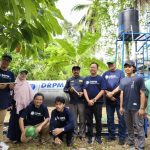FTMD Lecturers Have a Talk Show on Innovation and Defense Research at PRIMA 2023
Bandung – On December 20, 2023, the Office of the Vice-Rector for Research and Innovation of ITB organized the Exhibition of Research Results, Innovation, and Community Service ( Pameran Hasil Riset, Inovasi, dan Pengabdian Masyarakat / PRIMA) 2023. The agenda was held in a hybrid format, with offline events taking place in the Aula Timur and Aula Barat ITB.
The PRIMA 2023 event featured a series of activities, including a talk show held in the Aula Timur (East Auditorium ITB). One of the discussion sessions was themed “Grasping the Future: Research Innovation for Industrial Sustainability” and was presented by Dr. Ir. Sri Raharno, S.T., M.T., and Dr. rer. nat. Mardiyati, S.Si., M.T. Both are lecturers from the Faculty of Mechanical and Aerospace Engineering (FTMD).
Dr. Ir. Sri Raharno, S.T., M.T. discussed “Enhancing the competitiveness of labor-intensive national manufacturing industries through the application of a configurable virtual workstation framework.”
In the current era of modern industry, labor-intensive manufacturing industries still dominate, utilizing conventional machines to produce various types of products. Despite this, the manufacturing industry is seen as the future in terms of flexibility, enabling the production of diverse products according to market needs. However, the challenge lies in the industry’s ability to produce low volume but highly varied products. Unfortunately, some manufacturing industries that rely on estimation methods without accurate field data often face problems, especially in controlling the quality of their products. This raises concerns about efficiency and accuracy in future production.
In efforts to enhance industrial flexibility, the latest innovation focuses on processing data from Flores to provide accurate feedback. While promising, this concept encounters several challenges that need to be addressed. Firstly, the investment required to build such a system is deemed very expensive. Additionally, implementing this technology requires many sensors and may potentially increase the workload for existing operators. However, as a solution, the industry is now working to develop innovative systems with more affordable costs and ensuring that operators are not burdened with excessive additional work.
Dr. rer. nat. Mardiyati, S.Si., M.T. discussed “Towards the self-sufficiency of the red and white industry: how to build a culture of innovation and research collaboration.”
She explained that ITB has collaborated with PT PINDAD to create homegrown propellants, which are currently considering local raw material sources to enhance self-sufficiency in production. One of the raw materials needed to make propellants is cotton linters, which Indonesia does not have, and its climate conditions do not support its growth. To reduce the dependence on imports and external parties, scientists emphasize the importance of engineering and innovation processes based on knowledge and the courage to innovate. To achieve this, several faculties and schools at ITB have collaborated, including FMIPA, FTI, FTMD, STEI, and Chemical Engineering, to explore potentials and solutions to obtain alternative raw materials suitable for propellants.
She also added that to date, ITB and PT PINDAD have successfully achieved the performance target of 5.56, using formulations and technology originating from Indonesia, with no interference from external parties.
As an institution focused on the development of knowledge, ITB consistently produces graduates who are not only proficient in their academic fields but also have a deep understanding of societal needs. Thus, expertise in scientific knowledge becomes a valuable resource in creating innovations that can contribute to Indonesia’s progress and positively impact the daily lives of the people.







